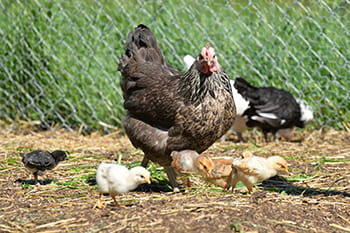Avian Influenza in Poultry

Avian influenza is a federally reportable disease under the Health of Animals Act. This virus, commonly known as “bird-flu,” affects food-producing birds including chickens, turkeys, geese, ducks and quails, as well as pet and wild birds. The avian influenza virus exists in two forms: low pathogenicity (LPAI); and high pathogenicity (HPAI). Pathogenicity refers to the severity of the illness caused in birds.
The Ministry of Agriculture continues to closely monitor the situation. There are no animal health control area orders in effect at this time.
Wild birds, especially waterfowl, are natural reservoirs of influenza viruses. Outbreaks of avian influenza in domestic poultry are usually associated with the migration patterns of these birds. Birds with access to the outdoors are considered most at risk for being exposed to avian influenza because of the potential contact with or contamination from wild birds. Producers can safeguard and maintain flock health by following the basic biosecurity recommendations below.
1. Prevent Contact With Wild Birds
Wild birds can transmit diseases through direct bird-to-bird contact or indirectly through contaminated environments, feed, water, equipment or clothing. To minimize the risk of disease transmission, do not handle or feed any wild birds by hand. Feeding encourages wild birds to congregate around food sources and can increase the probability of disease transmission among wild birds. Adequate fencing and proper feed storage can help to limit potential exposure to wild birds. Domestic birds should not be provided with untreated water from sources that may have been visited by waterfowl. Learn more about Avian Influenza in Wild Birds.
2. Maintain Cleanliness
Viruses, parasites and bacteria can survive in the environment for days to weeks. Proper cleaning and disinfection can help to reduce the risk of disease transmission. Facilities and equipment should be routinely cleaned and disinfected. Equipment should not be shared or borrowed from other bird owners. Barn specific clothing and footwear should be dedicated to each facility and should be routinely changed.
A simple cleaning and disinfection process, as recommended by the Canadian Food Inspection Agency (CFIA) is described below:
- Scrub all surfaces using hot, soapy water to remove all visible contamination.
- Scrub all surfaces using a solution of 50 mL of household bleach (sodium hypochlorite 5 - 6 per cent) and 4 L of water.
- Let stand until all surfaces are dry.
- More information on cleaning and disinfection can be found on the CFIA website.
3. Monitor Your Flock
Sudden death of large numbers of birds is not uncommon with HPAI. Owners are legally responsible for notifying the Canadian Food Inspection Agency (CFIA) of reportable and notifiable bird diseases such as avian influenza. Producers should monitor their birds daily and report any unusual signs or symptoms. Symptoms of avian influenza can include:
- Sudden death of birds;
- Lack of energy and appetite;
- Decreased egg production;
- Swelling around the head, neck and eyes;
- Coughing, sneezing, or gasping for air; and
- Tremors or lack of co-ordination.
It is always better to be overcautious – report any suspected ill birds to your flock veterinarian and contact the local CFIA office if avian influenza is suspected. Early reporting can greatly limit the spread and impact of disease. There are resources available of what to do if a producer thinks their animals may be infected.
Although rare, avian influenza can also infect humans. Affected people tend to be those who have close contact with infected birds, such as poultry producers, or heavily contaminated environments. Signs in humans are similar to other forms of influenza. For more information on avian influenza in people, see What to Know About Avian Influenza from the Saskatchewan Ministry of Health.
Small flock poultry are at an increased risk of contracting HPAI and other infectious diseases. This is because poultry with access to the outdoors can have direct contact with wild birds or contaminated environments. The Ministry of Agriculture provides testing support to small flock producers through our Saskatchewan Small Flock Poultry Surveillance Program.
4. Limit Visitors
People are capable of transporting and transmitting diseases, especially if they have had recent contact with other birds. The best strategy is to prohibit visitors. If someone must enter your property or handle your birds, ensure that the visitor is wearing clean clothing and boots. Providing shoe or boot covers or using a foot bath can further limit the spread of potential disease. Proper handwashing techniques should be implemented before and after the handling of any birds. Lastly, if employees, visitors or other personnel are sick and have symptoms of influenza there should be no contact with any birds.
5. Isolate New Birds
Any new birds should be kept separate and monitored for at least 30 days before being introduced into the flock. Birds returning from shows, exhibits or other communal events should also be isolated for at least two weeks.
In Saskatchewan, all species of poultry are designated livestock animals. As such, all poultry producers are required to register with the Provincial Premises Identification (PID) system, no matter how many or how few birds you may have. Saskatchewan's PID system links livestock and poultry facilities to geographic locations. This information is critical when preparing for, responding to and recovering from animal health issues and emergencies, such as an outbreak of avian influenza.
The Canadian Food Inspection Agency has further information on poultry biosecurity on their website. An update on HPAI regarding small flock poultry can also be found at the following webinar recording by Western Canadian Animal Health Network (WeCAHN): Update on Highly Pathogenic Avian Influenza (HPAI) and Small Flock Poultry.
Industry Partners:
Chicken Farmers of Saskatchewan 1-306-242-3611
Saskatchewan Broiler Hatching Egg Producers Inc. 1-306-384-8050
Saskatchewan Egg Producers 1-306-664-4131
Turkey Farmers of Saskatchewan 1-306-931-1050
Chicken Farmers of Canada 1-613-241-2800
Turkey Farmers of Canada 1-905-812-3140
